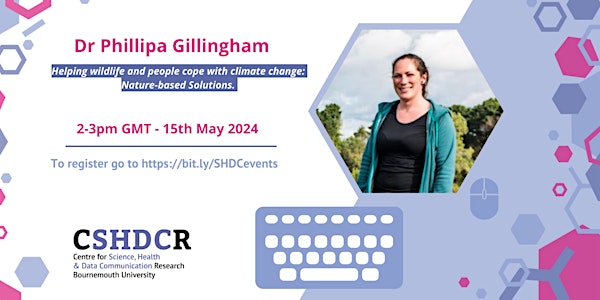
Helping wildlife & people cope with climate change: Nature-based Solutions
Is enough is being done to help nature? The Nature-Based Solutions to climate change which aim to benefit both wild species and society
By BU Centre for Science, Health & Data Comm Research
Date and time
Wednesday, May 15 · 6 - 7am PDT
Location
Online
About this event
- 1 hour
Organized by
The Centre for Science, Health, and Data Communications Research focuses on the urgent need for better science, health and data communication through ambitious cross-disciplinary collaborations. From reporting statistics, to tackling disinformation, from health and wellness interventions to more efficient communication around environmental and humanitarian disasters, our members respond to real world issues—often in real time.